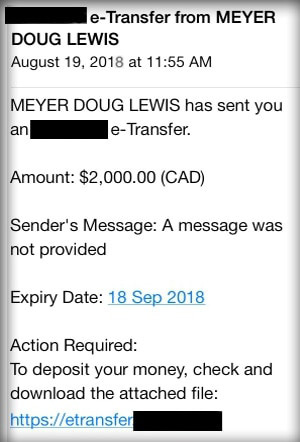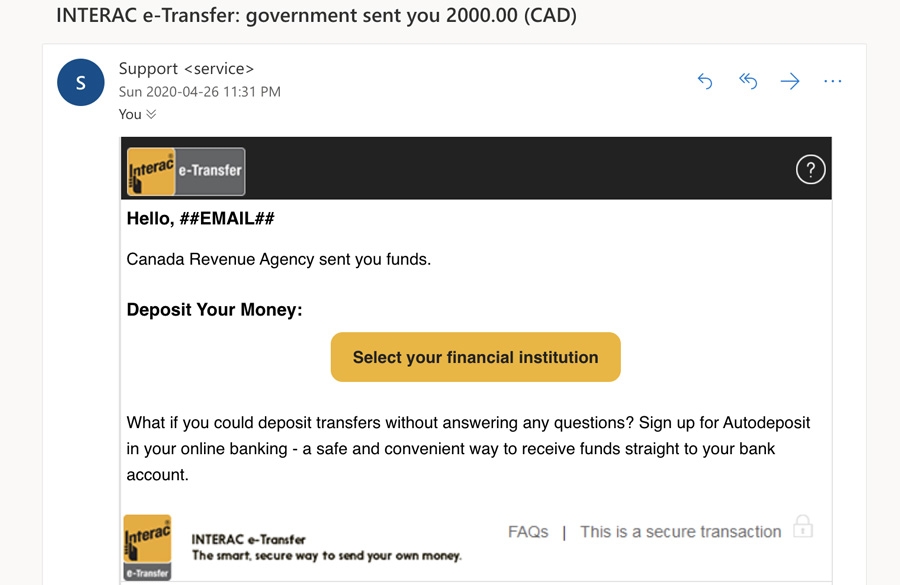Email Money Transfer: How The Scam Works
One of the most useful features that bank cards and accounts have is electronic transfer via email. Users can send money to their family members or friends, making the etransfer option very convenient. Unfortunately, a scam going around these days has also been making already a lot of victims. It comes as an etransfer from the government for $2,000 as a result of the COVID-19 pandemic federal support.
As many people applied for the special financial programs designed for financial aid – whether it's the CARES Act in the United States or the Canada Emergency Response Benefit (CERB) in Canada, this etransfer email is nothing but a fraudulent attempt to rob you of your money. If you qualify for financial support, the government deposits the funds automatically in your account.
Scam Detectors Most Trusted Websites in Online Security
- Guard.io (100): Surf the web safely. Clean up your browser, remove malicious extensions and check for privacy violations.
- Incogni.com (100): Delete your personal data from the internet and protect against scams and identity theft.
- ExpressVPN (100) Stay secure and anonymous online - Best VPN Out There
The eTransfer Scam occurred initially a couple of years ago. It was most likely perpetrated by the same criminals, as the amount of money was the same, and the style of the email was identical. Back then, the recipients of the message were informed that a "Meyer Doug Lewis" just sent them $2,000 – see below.

The content of the email, the sender's name (financial institution), and even the subject title are the same as it would be from a legitimate money transfer. With links, disclaimers, footer, branding, etc. Only…it's not. Who was Meyer Doug Lewis? Nobody, just a scammer who used a fake name to make you ask yourself the same question. The name could, indeed, be a different one, so beware.
Fraudsters use the same text from a legitimate money transfer notification email, but require you to click on a file (rar.) that infects your computer and gets access to your personal information.
Watch the video below to see the eTransfer Scam exposed on the news:
Email Money Transfer Scam: How To Avoid
Although the email looks almost identical to a real notification sent to you when receiving money, look for the email address of the sender. In the etransfer from the government case, the email address of the sender doesn't show up – it's just the name 'service'. The address for the Meyer Doug Lewis was [email protected]. Far away from the official domains that any bank or financial institution has. Also, when you receive money, you don't have to download or open any rar.file.
Just delete the email and carry on with your happy day.
Email Money Transfer Scam: How To Report
Warn your family and friends about the Email Money eTransfer Scam by sharing it on social media here, using the buttons provided. You can also officially report the scammers and their email addresses to the Federal Trade Commission using the link below:
Report To The FTC HereVerify a website below
Are you just about to make a purchase online? See if the website is legit with our validator:
vldtr®


TOP 4 MUST-WATCH FRAUD PREVENTION VIDEOS
1. Top 5 Amazon Scams in 2024 2. Top 5 PayPal Scams in 2024 3. How To Spot a Scam Email in 2024
- Latest Posts by Selma Hrynchuk
-
Compromised Credit Card Scam
- -
Fake Google Chrome Update
- -
Facebook Privacy Notice Hoax
- All Posts














In the time of this ongoing pandemic most of the people helping each other. But it is sad to see that few people taking advantage of this. Thanks for making people aware about all this surely it will save them to get into this trap